| This page in a nutshell: Some editors choose to acknowledge their service to Wikipedia by displaying a service award which denotes time served and number of edits made. These awards are unofficial – displaying the wrong one carries no penalty (except possible disapproval from other editors) and displaying the right one does not indicate authority or competence. |
| Part of a Wikipedia help series on |
| Wikipedia Awards |
|---|
 |
|
|
| Awarded by co-founder Jimmy Wales |
| Awards by WikiProject |
| Barnstars and other personal awards |
| Awards by number of edits |
| See also |
|
|
Service awards are a simple way of acknowledging an editor's level of contribution based on two specific benchmarks: the number of contributions that the editor has made to Wikipedia and the length of time registered. One academic has described Wikipedia's service award schema as a way to award the self.[1] One may also think of them as auto-attained milestones.
This award is unlike other awards given from one editor to another in a show of appreciation; it is intended to be given to yourself, although it can also be given by a second party. It is achieved by a strictly mechanical count of time registered and number of edits. There is no process for receiving these awards; you just determine the grade to which you are entitled, then display it on your user page. Typically, both the time and edit-count requirements are met before considering oneself eligible for each award level.
Please remember that neither the number of edits nor the length of time from when an account was created is a good indicator of the quality of an editor's contributions or diplomatic ability. Hence, service awards do not indicate any level of authority whatsoever; "master" editors are not bestowed with more authority through this award than "novice" editors.
Award levels
[edit]Overview
[edit]There are currently 23 award levels. The first level serves as a base level. The "Signator-to-Ephoros" track is a humorous alternative for those who find the more formal titles too staid.
- Signator is from the Latin signātōrius, which means someone who has made a mark.
- Burba means "recruit" in Venetian.
- Novato is Spanish and Portuguese for "beginner".
- Grognard (French for "grumbler") was Napoleon's pet name for his Old Guard.
- Ephoros (ἔφορος) refers to the title given to the five highest-ranked Spartan magistrates.
- Tutnum, Labutnum, Looshpah, Togneme, and Gom are made-up words that are intended to sound impressive.
For the first five levels, there are also incremental service awards to use between the major service awards. There are 20 incremental service awards, with four levels of incremental service award for each of the first five service awards.
For the sake of variety, three badge variants are provided for each level: a medal, a book, and a ribbon (thanks to Wikipedia:Ribbons). To keep the validity and status of the major service awards, a ribbon is the only variant for incremental service awards. Editors may display the badge of their preference, a combination of badges, or none at all.
To learn your edit count and the date of your first logged edit, click Preferences where this information will appear under View global account info. A more detailed edit counter is the User Analysis Tool (a replacement for X!'s edit counter); there are also other edit counters and analysis tools. These tools do not always provide equal numbers because they rely on different methods of calculation.
Requirements
[edit]The following table lists the requirements for each award level. Both the length of service and total number of edits must be met for each award level.
- ^ a b c Before December 2019, these Alternative Awards used "Lord" instead of "Grand", and uses of the original terms may still be seen in the wild. See Wikipedia talk:Service awards/Archive 7#Inclusivity? (or, Gender-Neutral Service Award Titles).
Exposition on the requirements
[edit]What is counted?
[edit]How to count your edits is up to you. It is generally assumed that all edits, even including edits by bots and deleted edits, are okay to count. If you want to count edits on other Wikimedia projects, that is okay too. If you began as an anonymous IP editor and want to count from the time of your first IP edit, that is also okay. If you run or ran more than one account, you may choose to include the edits for your other user accounts as well. If you are or were an administrator, you can count your administrative actions as edits if you want. You may also begin counting the amount of time you have been an editor from an older account or IP address of yours. It is all based on the honor system, so do what you think gives you the most fair and accurate award level.
To clarify, though, both the edit count and the time for a given level are required to achieve that level.
Rationale for the requirements
[edit]The edit count requirements for the levels are based on what, in the opinion of the editors who formulated the requirements, could be achieved by a human editor working with considerable regularity and diligence using the default tools and a fairly typical editing pattern. The awards for the first two years require a considerably lower edit rate than those for the later years.
Bots and editors using certain tools or editing patterns may achieve higher rates, while editors using certain editing patterns (such as mainly posting completed articles with a single edit and so forth) may have lower rates, and of course editors who do not edit regularly may have lower rates.
Thus, not all editors will see a good match between service time and edit counts (some editors may be eligible for a high level by service time but not by edit count, while other editors may be eligible for a high level by edit count, but not by service time). This is an imperfection which is an inherent consequence of the decision to use an uncomplicated system for determining eligibility for each award.
- The first seven levels (up to Veteran Editor or Tutnum), which cover the first two years of one's editing career, would require a rate of 4,000 edits per year (an average of approximately 11 edits per day) if one were to advance levels with edit counts and service time in perfect synchronization (except that the second level, Novice Editor or Burba, requires only 200 edits rather than 333, a rate of 2,400 edits per year, for an average of approximately 6.6 edits per day).
- Levels 8 through 11 (up to Senior Editor or Labutnum), which cover the next two years of one's editing career, would require a rate of 8,000 edits per year (an average of approximately 22 edits per day) if one were to advance levels with edit counts and service time in perfect synchronization.
- Levels 12 through 21 would require a rate of 9,000 edits per year (an average of approximately 25 edits per day) if one were to advance levels with edit counts and service time in perfect synchronization.
- Level 22 would require a rate of 12,500 edits per year (an average of approximately 34 edits per day) if one were to advance levels with edit counts and service time in perfect synchronization.
- Level 23 would require a rate of 15,000 edits per year (an average of approximately 41 edits per day) if one were to advance levels with edit counts and service time in perfect synchronization.
Images, userboxes, and top icons
[edit]You can place the ((Service awards)) template on your user page to show the image, userbox, or top icon most appropriate for your time of service and edit count. For it to calculate the time you have been registered with Wikipedia, you must give it |year=, |month= and |day= parameters specifying your registration date. You must also give your edit count using an |edits= parameter, and update this each time your edits pass one of the service award levels. The |format= parameter can be used to specify the display format. See the template's documentation for details.
The ((Service award progress)) template can show your progress towards the next service award. Like ((Service awards)), it also requires |year=, |month=, |day= and |edits= parameters to specify when you registered and how many edits you have made.
Alternatively, you can pick an award template from the following table:
Registered Editor (or Signator)[edit] | |||||||
 |
 |
|
Requirements:
Incremental service award ribbons are also available, starting at 50 edits and 8 days of service. | ||||
Novice Editor (or Burba)[edit] | |||||||
 |
 |
|
Requirements:
Incremental service award ribbons are also available, starting at 400 edits and 1 month 15 days of service. | ||||
Apprentice Editor (or Novato)[edit] | |||||||
 |
 |
|
Requirements:
Incremental service award ribbons are also available, starting at 1,250 edits and 3 months 23 days of service. | ||||
Journeyman Editor (or Grognard)[edit] | |||||||
 |
 |
|
Requirements:
Incremental service award ribbons are also available, starting at 2,500 edits and 7 months 15 days of service. | ||||
Yeoman Editor (or Grognard Extraordinaire)[edit] | |||||||
 |
 |
|
Requirements:
Incremental service award ribbons are also available, starting at 4,500 edits and 13 months and 15 days of service. | ||||
Experienced Editor (or Grognard Mirabilaire)[edit] | |||||||
 |
 |
|
Requirements:
| ||||
Veteran Editor (or Tutnum)[edit] | |||||||
 |
 |
|
Requirements:
| ||||
Veteran Editor II (or Grand Tutnum)[edit] | |||||||
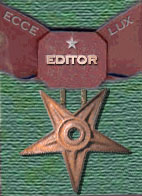 |
 |
|
Requirements:
| ||||
Veteran Editor III (or Most Perfect Tutnum)[edit] | |||||||
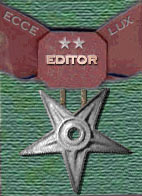 |
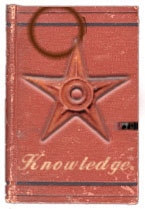 |
|
Requirements:
| ||||
Veteran Editor IV (or Tutnum of the Encyclopedia)[edit] | |||||||
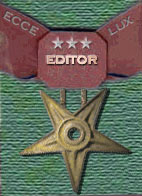 |
 |
|
Requirements:
| ||||
Senior Editor (or Labutnum)[edit] | |||||||
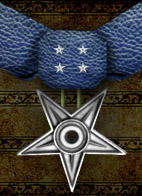 |
 |
|
Requirements:
| ||||
Senior Editor II (or Most Pluperfect Labutnum)[edit] | |||||||
 |
 |
|
Requirements:
| ||||
Senior Editor III (or Labutnum of the Encyclopedia)[edit] | |||||||
 |
 |
|
Requirements:
| ||||
Master Editor (or Illustrious Looshpah)[edit] | |||||||
 |
 |
|
Requirements:
| ||||
Master Editor II (or Auspicious Looshpah)[edit] | |||||||
 |
 |
|
Requirements:
| ||||
Master Editor III (or Most Plusquamperfect Looshpah Laureate)[edit] | |||||||
 |
 |
|
Requirements:
| ||||
Master Editor IV (or Looshpah Laureate of the Encyclopedia)[edit] | |||||||
 |
 |
|
Requirements:
| ||||
Grandmaster Editor (or Grand High Togneme Vicarus)[edit] | |||||||
 This editor is a Grandmaster Editor and is entitled to display this Lapis Philosophorum Editor Star with the Neutronium Superstar. |
 |
|
Requirements:
| ||||
Grandmaster Editor First-Class (or Grand High Togneme Laureate)[edit] | |||||||
 This editor is a Grandmaster Editor First-Class and is entitled to display this Mithril Editor Star with the Neutronium Superstar hologram. |
 |
|
Requirements:
| ||||
Vanguard Editor (or Grand Gom, the Highest Togneme of the Encyclopedia)[edit] | |||||||
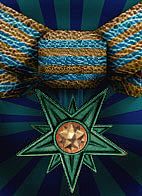 This editor is a Vanguard Editor and is entitled to display this Unobtainium Editor Star with the Neutronium Superstar hologram. |
 |
|
Requirements:
| ||||
Senior Vanguard Editor (or Supreme Gom, the Most Exalted Togneme of the Encyclopedia)[edit] | |||||||
 This editor is a Senior Vanguard Editor and is entitled to display this Duranium Editor Star with the Neutronium Superstar hologram. |
 |
|
Requirements:
| ||||
Ultimate Vanguard Editor (or Cardinal Gom, the August Togneme of the Encyclopedia)[edit] | |||||||
 This editor is an Ultimate Vanguard Editor and is entitled to display this Meitnerium Editor Star with the Neutronium Superstar hologram. |
 |
|
Requirements:
| ||||
Sagacious Editor (or Ephoros of the Encyclopedia)[edit] | |||||||
 This editor is a Sagacious Editor and is entitled to display this Carbonadium Editor Star with the Strangelet Superstar. |
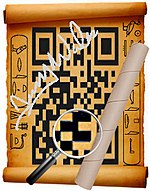 |
|
Requirements:
| ||||
See also
[edit]- Wikipedia:Awards
- Wikipedia:Barnstars
- Wikipedia:Administrative service awards
- Wikipedia:Incremental service awards (Ribbons)
- Wikipedia:List of Wikipedians by number of edits
- Wikipedia:Ribbons
- Wikipedia:Userboxes
- Wikipedia:Ten Year Society
- Wikipedia:Fifteen Year Society
- Wikipedia:Twenty Year Society
- Wikipedia:Wikipedians
- ((Service awards)), a template for displaying one's service award badge
- ((Service award progress)), a template for showing one's progress toward the next level
References
[edit]- ^ Ashton, Daniel (January 3, 2011). "Awarding the self in Wikipedia: Identity work and the disclosure of knowledge". First Monday. 16 (1). doi:10.5210/fm.v16i1.3156. Archived from the original on January 26, 2013. Retrieved January 8, 2016.
| Awarded by co-founder Jimmy Wales |
|
|---|---|
| Awards by WikiProject | |
| Barnstars and other personal awards | |
| Awards by number of edits | |
| See also | |



































